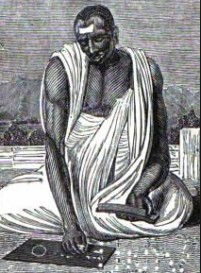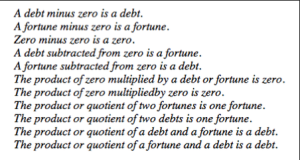To this day, the concept of zero continues to be a struggle for students. It is difficult to think about the fact that there could just be nothing, just an empty space. Or that someone could have “zero” of something, meaning that they really just have nothing. Before we talk about zero and the discovery of it, we should talk about who truly discovered zero.

The Ancient Indian astronomer and mathematician, Brahmagupta, is given the credit for discovering the number zero. Born in the city of Bhinmal in Northwest India, Brahmagupta is the only scientist that we are able to thank for discovering the concept of zero. If he hadn’t discovered it, where would we be? The lack of zero in our number system would mean that calculus, algebra, quadratics, negative numbers, geometry, almost every aspect of advanced mathematics would not exist in our world today. Along with the discovery of zero, Brahmagupta had many other successes during his lifetime career of being an astronomer and mathematician. Some of these are the rules and properties of zero, discovered the formula for solving quadratic equations, indicated that Earth was closer to the moon than the sun, calculated Earth’s circumference, and established the rules for working with both positive and negative numbers. As we can see, Brahmagupta was thoroughly involved with mathematics and made impressive discoveries along the way. One interesting fact about this man, is that most of his mathematical discoveries were actually documented in the form of poetry. I thought that was pretty cool! Now, let’s talk about nothing.
Where did zero come from? How did it all of a sudden show up into our number system? Well to begin with, the Sumerians were the first to develop a counting system to keep track of all their goods. They used a positional system, where the value of a symbol is dependent on its position. After they developed their system, it was commonly used and was eventually passed down to Akkadians around 2500 BC and eventually to the Babylonians in 2000 BC. It is told that the Babylonians were the first to use a ‘mark’ to symbolize that a number was absent from a column in this positional system. This may have been the start of the concept of zero. But who really took it one step further and investigated the mysterious number? It was the Indians who began to understand zero both as a symbol and as a concept in the numerical system. This is where Brahmagupta comes into the picture, determined to understand the meaning of zero. Around 650 AD, Brahmagupta was the first to articulate the formal operations using zero, his form of ‘zero’ was using dots underneath numbers to indicate the zero. These dots were sometimes referred to as ‘sunny’, meaning empty, or ‘kha’, meaning place. After Brahmagupta formalized his theories for the discovery of zero, he wrote a series of rules for obtaining zero through addition and subtraction. Along with these rules, he also found the results of the operations with zero.
The only thing that Brahmagupta has seemed to get incorrect with these rules is the fact that a number divided by zero is actually undefined or infinite rather than zero. This has sparked many arguments throughout the mathematics world, and even in my capstone. The general argument is that a room full of math majors could not decided whether 0 divided by 0 was going to be 0, 1, undefined, or infinite. After doing a good amount of research, it seems as though a number divided by zero is simply undefined, there is no answer. As told in history, the division by zero would have to wait until Newton and Leibniz invented calculus. Some parts of the world would also have to wait for the concept of zero to come along to expand their knowledge on their number systems since it still took a few centuries before the concept of zero reached Europe. It is told that first, Arabian voyagers would bring the texts of Brahmagupta and he colleagues back from India along with other exotic items, like spices. By 773 AD, the concept of zero had reached Baghdad and would eventually be developed into the middle east by Arabian mathematicians who worked through the Indian number system.
By 879 AD, many years after the concept of zero had reached Baghdad, zero was written as how we know it today! Along with this progression of the concept, zero had finally reached Europe around this same time thanks to the conquest of Spain by the Moors. Since zero had been discovered by all at this point in time, it started to be put to use in many different ways. Fibonacci, for example, used zero through his work on algorithms in the book Liber Abaci in 1202, Rene Descartes founded the cartesian coordinate plane, with the origin of (0, 0), and towards the 1600’s, Newton and Leibniz worked with numbers as they approached zero, leading to the discovery of limits and calculus. As we can see, we would not be as advanced as we are today in the mathematical world if zero had never been discovered. It is a magical number that is necessary for our number system to contain. If zero didn’t exist, what would we use to represent nothing? How would we subtract 4 from 4? We could not do simple addition or subtraction without zero, we would be just as confused as those before us.
http://yaleglobal.yale.edu/about/zero.jsp
http://www.smithsonianmag.com/history/origin-number-zero-180953392/?no-ist

Nice ode to zero. I don’t think nothing is the conceptual barrier. It’s that nothing is a number. As we’ve struggled in class, what is a number is a big question.
You make a good case that we need zero to be a number. If zero is a number, what does that say about numbers?
5Cs +
LikeLike